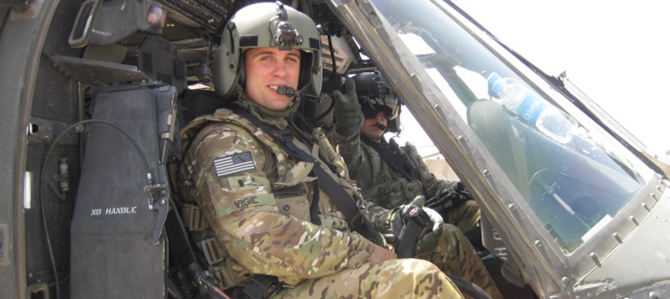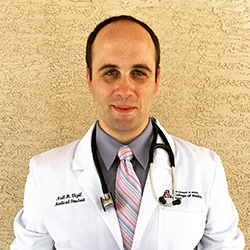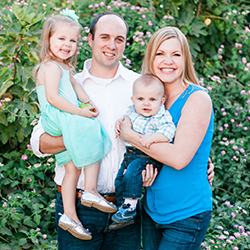
Second-Year Medical Student Chosen as 2018 Tillman Scholar

Neil Vigil, a second-year medical student at the University of Arizona College of Medicine – Phoenix, has been named a 2018 Tillman Scholar.

The Pat Tillman Foundation recognizes 60 scholars each year for their service, leadership and potential. The 2018 class will receive more than $1.3 million in scholarships to pursue higher education and continue their service in the fields of medicine, law, business, policy, technology, education and arts. The foundation has invested more than $16 million in academic support and named more than 580 Tillman Scholars from 100 academic institutions nationwide. A former Arizona Cardinals football player, Pat Tillman served with the 75th Ranger Regiment in Afghanistan. He died in April 2004.
Vigil enlisted in the Army as a medic after high school. He entered active duty in the spring of 2004 and served as a medic until he was selected to attend the United States Military Academy from 2006 to 2010. In May 2010, he was commissioned as an aviation officer and entered flight training at Fort Rucker, AL. After flight school, he was stationed in Katterbach, Germany, as a Blackhawk helicopter pilot and company executive officer.
“My time as an Army medic was my first experience in the medical field and the foundation for my desire to become a physician,” he said. “Serving as an infantry platoon medic taught me the importance of trust between provider and patient. My soldiers never mentioned any health issues in public, but it was my job as their medic to develop trust and communication to provide the care they needed.”
Vigil’s unit deployed to Shindand, Afghanistan, from May 2012 to March 2013. During deployment, he was selected to serve as the platoon leader of a 53-person platoon. Additionally, he flew aerial combat missions and tactical air assaults and served as an air mission commander. He left Germany in 2014 to attend an officer leadership course at Fort Rucker followed by a year-long assignment with the 1st Special Forces Group, Fort Lewis, WA.
For his last assignment in the Army, Vigil served as a company commander, responsible for leading 76 soldiers and civilians that instruct avionics, electrical and hydraulic aviation training for more than 700 soldiers annually. He left the Army in July 2017 to attend the UA College of Medicine – Phoenix.
“My choice to attend the College of Medicine – Phoenix really came down to the amazing people and culture,” he said. “I strongly felt that the collaborative community-focused culture found here was the environment I want guiding my development as a physician and supporting the community in which my family lives. The college’s culture fosters innovation and adaptability that will prepare us not only to be competent physicians, but also to be leaders ready to meet the challenges of a continually evolving health care environment.”
Although medical school is challenging, Vigil said he has the support of his wife and two children to keep him motivated. His favorite experience so far has been working on his scholarly project with his mentor, Ben Bobrow, MD. Dr. Bobrow and Vigil are working on a statewide analysis of suicide among EMS professionals compared to the general public. Additionally, they’re working on exploring the effectiveness of resiliency training for EMTs and firefighters.

Vigil is the youngest of six children. He spent the first 18 years of his life in the same house, in a tight-knit community of 700 people in Yamhill, Oregon. He said the community played a large part in developing his desire to serve others. He graduated from Yamhill Carlton High School in 2003 and from the United Stated Military Academy with a bachelor’s degree in Management in 2010.
“As someone that started medical school at 32, I think it’s important to remember that the journey is as important as the destination,” he said. “The path to becoming a physician is a marathon, not a sprint. Your experiences outside of medicine are important. They will help you better connect with your future patients, colleagues and communities. With 40 percent of the class of 2021 being re-applicants, I think it’s really evident that our school and admissions value life experience.”
About the College
Founded in 2007, the University of Arizona College of Medicine – Phoenix inspires and trains exemplary physicians, scientists and leaders to optimize health and health care in Arizona and beyond. By cultivating collaborative research locally and globally, the college accelerates discovery in a number of critical areas — including cancer, stroke, traumatic brain injury and cardiovascular disease. Championed as a student-centric campus, the college has graduated more than 900 physicians, all of whom received exceptional training from nine clinical partners and more than 2,700 diverse faculty members. As the anchor to the Phoenix Bioscience Core, which is projected to have an economic impact of $3.1 billion by 2025, the college prides itself on engaging with the community, fostering education, inclusion, access and advocacy.


